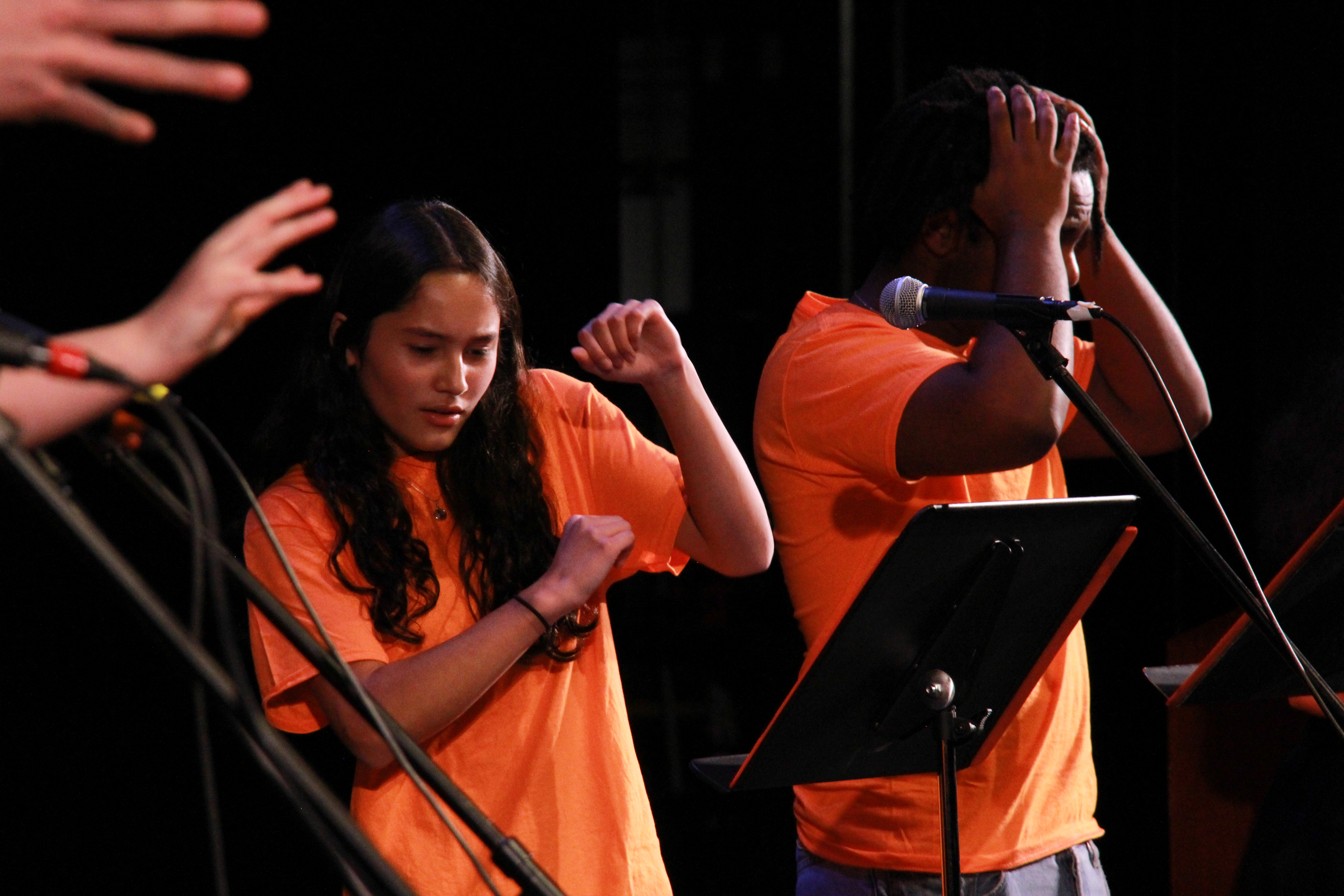Enough is Enough: Teens Challenge Gun Violence Through Theater
Written by TeenTix Newsroom Writer Violet Sprague

ENOUGH! PLAYS TO END GUN VIOLENCE is a nationwide initiative to confront gun violence in a new way. Guided by teens with a passion for theater and activism, this festival is a collection of staged readings of six bold 10-minute plays written by students around the US. These plays are saying what needs to be said about the impact of gun violence and inspiring meaningful action in communities across the country. The performance takes place in 30 states, in 53 cities, all on the same night. These teen playwrights have turned to theater to avoid becoming just another statistic, and their plays make the statement: Enough is enough.
I attended the festival, produced by Seattle Children’s Theatre, The 5th Avenue Theatre, and The Alliance for Gun Responsibility, on November 6, with my dad and my friend Rhea Thombre (age 14, she/her). The seats in the audience were full of a whole collection of people. The tickets to the show were free, which ensured everyone who wanted to was able to attend—all different ages, abilities, races, joined together by a taste for change. As we sat there in the small theater, there was a sense of community, a we're-all-in-this-together feeling.
“Part of the appeal was that it was student-written,” Rhea replied when I asked what initially enticed her about the show. “It's cool to see change coming directly from people of our age.”
At the start of the first play, A Call for Help, (a story about 911 dispatchers and three people in different emergencies), the seven teen actors walked out confidently, all wearing orange shirts. It was a neat detail that everyone in the festival wore orange, the color typically worn for National Gun Violence Awareness Day.
As soon as the plays started, the urgency, the passion, the sadness, the fury, all these emotions that the teens were expressing as they wrote the plays hung in the air. I personally hadn’t experienced a staged reading before, but I was sort of expecting the actors to be inanimate, like they were simply reading aloud from a book. But inanimate they were not. Though they weren’t physically moving around the stage, the actors conveyed the emotion through their tone of voice, gestures, facial expressions, and body language; it was every bit as captivating as if there were sets and costumes.

The festival’s format was particularly effective. Something only a collection of plays by multiple writers could do, was offer different perspectives. This would be considerably harder if there was only one play being read, and one story being told. These perspectives woven into the show overall deepened the issue. Who was telling their story? How was the story told? Additionally, there were many different narratives to go with each of these perspectives, touching on such a variety of different topics, from school shootings, to suicide, to police brutality, to homophobia, to racism. This emphasizes how the same topic has such a large impact on everyone. “It was really interesting how it represented so many different kinds of gun violence, and so many ways it could happen,” Rhea commented.
A detail I personally appreciated were the optional grounding exercises that were offered between each play. These short activities like breathing exercises and positive self-thinking helped restore a sense of serenity in the audience, and to ground everyone after being staggered by the power and emotion of these 10-minute plays.
The goal of ENOUGH! was to send a wave of change over the country by bringing attention to this urgent topic. By exposing teens and adults alike to firsthand experiences of gun violence and how it affects communities, they certainly succeeded. To be honest, it was hard for me to watch at some parts. I think this was because I had never really been exposed to the issue of gun violence this personally or directly before—it was eye-opening. “This show made it all a lot more personal,” Rhea told me. “You hear about gun violence in the news and you're like, ‘Wow, that's awful,’ but it doesn't really affect you. I feel like this gave me much more of an emotional connection.” That emotional connection is what made it so impactful for me as well. I left the theater with thoughts of how I could help or make change.
Lead photo credit: Youth performers in ENOUGH! Photo by Tally L and Zeppelin, Youth in Focus student photographers
The TeenTix Press Corps promotes critical thinking, communication, and information literacy through criticism and journalism practice for teens. For more information about the Press Corps program see HERE.
This article was written by a TeenTix Newsroom writer on special assignment through the TeenTix Press Corps.

